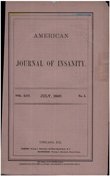Pilot study of explicit grading criteria in the American Board of Psychiatry and Neurology. Part II. Examination
Abstract
OBJECTIVE: The purpose of this study was to identify specific competencies that differentiated passing from failing performance on the American Board of Psychiatry and Neurology Part II oral board certification examination. METHOD: A total of 363 candidates were rated in 18 areas of competence defined by behavioral criteria. Data were analyzed to determine which areas best discriminated between passing and failing candidates. RESULTS: In both parts of the examination, the ability to develop a comprehensive treatment plan was most influential. After that, specific interview and observational skills discriminated best. Failing candidates had most difficulty detecting and following informational and affective cues in their interview of a patient and presenting a biopsychosocial formulation and comprehensive treatment plan. CONCLUSIONS: Specific candidate competencies related to passing and failing performances can be identified and assessed by a rating scale of observable behaviors on the board certification examination in psychiatry.
Access content
To read the fulltext, please use one of the options below to sign in or purchase access.- Personal login
- Institutional Login
- Sign in via OpenAthens
- Register for access
-
Please login/register if you wish to pair your device and check access availability.
Not a subscriber?
PsychiatryOnline subscription options offer access to the DSM-5 library, books, journals, CME, and patient resources. This all-in-one virtual library provides psychiatrists and mental health professionals with key resources for diagnosis, treatment, research, and professional development.
Need more help? PsychiatryOnline Customer Service may be reached by emailing [email protected] or by calling 800-368-5777 (in the U.S.) or 703-907-7322 (outside the U.S.).



